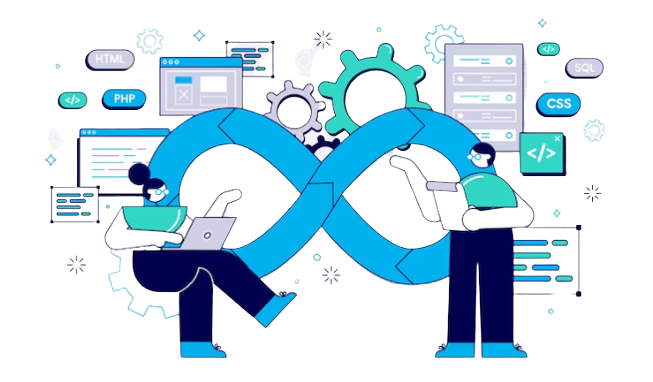DevOps culture is a game-changer in software development, promoting collaboration, communication, and automation. By embracing DevOps principles, organizations can achieve faster time-to-market, improved software quality, and increased stability. The benefits of DevOps culture extend beyond the development process and positively impact the entire organization.
In today’s fast-paced software development landscape, businesses are constantly seeking ways to improve collaboration, speed, and efficiency. This is where DevOps culture comes into play. DevOps, a combination of development and operations, emphasizes collaboration, communication, and automation to streamline software delivery. In this blog post, we will explore the significance of DevOps culture in driving collaboration and efficiency in software development.
Understanding DevOps Culture
- Defining DevOps:
DevOps is a cultural and professional movement that aims to bridge the gap between development and operations teams to enable faster, more reliable software delivery. It promotes close collaboration, continuous integration, continuous delivery, and automation throughout the software development lifecycle.

- Core Principles:
- Collaboration: Foster a culture of collaboration and shared responsibility between development and operations teams.
- Continuous Improvement: Encourage a mindset of continuous learning and improvement to drive efficiency and innovation.
- Automation: Automate manual processes to reduce errors, save time, and increase efficiency.
- Feedback Loop: Establish a feedback loop to gather insights, learn from failures, and continuously enhance the software development process.
Benefits of DevOps Culture in Software Development
- Enhanced Collaboration:
DevOps culture breaks down silos between development and operations teams, fostering better communication and collaboration. Cross-functional teams work together seamlessly, resulting in faster problem-solving, reduced bottlenecks, and improved overall efficiency.
- Accelerated Time-to-Market:
By embracing DevOps culture, organizations can automate manual tasks, implement continuous integration and delivery practices, and reduce time-to-market for software releases. Continuous feedback and iteration enable faster and more frequent deployments, giving businesses a competitive edge.
- Improved Software Quality:
DevOps culture emphasizes the use of automated testing, code reviews, and continuous monitoring, which results in higher software quality. Early identification and resolution of issues lead to fewer bugs and vulnerabilities in the production environment.
- Increased Stability and Reliability:
With DevOps practices such as infrastructure-as-code and automated deployments, organizations can achieve greater stability and reliability in their software systems. Automated testing, monitoring, and rollback mechanisms ensure that deployments are safe and issues can be quickly addressed.
Key Components of DevOps Culture
- Shared Goals and Ownership:
Development and operations teams align their goals to focus on delivering high-quality software and excellent user experiences.
Encourage a sense of ownership and shared responsibility for the entire software development lifecycle.
- Continuous Integration and Continuous Delivery (CI/CD):
Implement CI/CD pipelines to automate the process of building, testing, and deploying software. Continuous integration ensures that code changes are frequently merged, while continuous delivery enables the rapid and automated release of the software.
- Automation and Infrastructure-as-Code (IaC):
Utilize automation tools and practices to streamline repetitive tasks, such as provisioning infrastructure and deploying applications. Infrastructure-as-code enables the creation of infrastructure using code, allowing for consistency, scalability, and version control.
- Continuous Monitoring and Feedback:
Implement monitoring and logging systems to gain visibility into software performance and user behavior. Gather feedback from users, stakeholders, and operations teams to identify areas for improvement and enhance the software delivery process.
Challenges and Considerations
- Organizational Change:
Adopting DevOps culture requires a shift in mindset and a willingness to embrace change. Overcoming resistance, fostering a learning culture, and providing training and support are essential for successful adoption.
- Communication and Collaboration:
Effective communication and collaboration can be challenging when geographically distributed teams have different work cultures. Employing tools and practices that facilitate communication, such as chat platforms and collaborative software, can help bridge the gap.
- Legacy Systems and Processes:
Integrating DevOps practices into existing legacy systems and processes may require significant effort and planning. Incremental adoption, identifying low-hanging fruits, and gradually modernizing systems can ease the transition.
- Security and Compliance:
Security and compliance must be prioritized when adopting DevOps practices. Implementing secure coding practices, conducting regular security assessments, and ensuring compliance with regulatory requirements are crucial.
Conclusion
DevOps culture, supported by Tanbits DevOps services, is a game-changer in software development, promoting collaboration, communication, and automation. By embracing DevOps principles, organizations can achieve faster time-to-market, improved software quality, and increased stability. The benefits of DevOps culture extend beyond the development process and positively impact the entire organization. However, successful adoption requires a commitment to cultural change, effective communication, and addressing challenges. With the right mindset, practices, and tools, businesses can harness the power of DevOps culture to drive collaboration and efficiency in software development, leading to better outcomes and satisfied customers.
BACK










